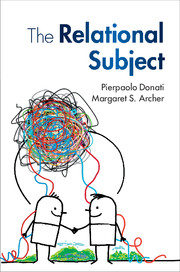1 - Introduction: Relational Sociology: reflexive and realist
from Part I
Published online by Cambridge University Press: 05 July 2015
Summary
The rationale for this book
Increasingly, theorists of many different persuasions are presenting themselves as ‘Relational Sociologists’. Yet it is difficult to see how there could be a sociological theory that was not concerned with relations in some sense of the term. The problem is that those appropriating this adjective for their theorizing mean very different things by it: ontologically, epistemologically, and methodologically. When Relational Sociology is proclaimed as a ‘manifesto’, the expectation is that its signatories will be endorsing at least the main planks of an ‘explanatory programme’; but even this is not the case. Moreover, ‘manifestos’ issued in any domain are promissory notes; what they promise is to perform a task better than did their predecessors. The trouble here is that the best known versions of ‘Relational Sociology’ – largely North American – do not even address the scope of this enterprise as traditionally conceived in the discipline.
Sociology came into being to seek answers to four questions about the social order: ‘Where have we come from?’, ‘What is it like now?’, ‘Where is it going?’, and ‘What is to be done?’ These are all realist questions: there is a real social world with real properties inhabited by real people who collectively made the past and whose causal powers are already shaping the future. One way in which Weber expressed the vocation of sociology was to discover why things are ‘so’ and not ‘otherwise’. In other words, the purpose of the discipline was explanatory. Both authors of this book situate themselves uncompromisingly in this tradition and in their previous works have struggled to contribute something to answering all four key questions. This distinguishes us from nearly all of those today who term themselves ‘Relational Sociologists’ and who retreat further and further from trying to explain anything. We can illustrate this most pungently by simply asking: ‘What do those proclaiming their approaches to be distinctively “relational” contribute to our understanding of what is happening today in our one global society?’ We are not exigently demanding a grand theory, but more modestly asking for a statement of their explanatory programme.
- Type
- Chapter
- Information
- The Relational Subject , pp. 3 - 32Publisher: Cambridge University PressPrint publication year: 2015

